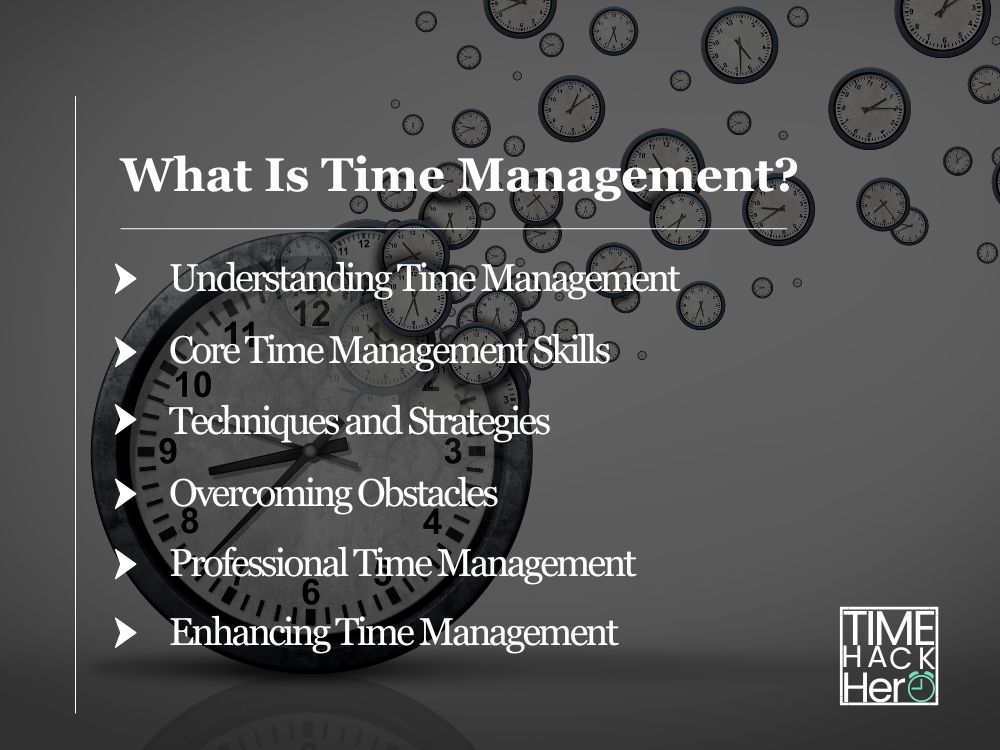Time management is a crucial skill that involves consciously planning and controlling the time spent on specific tasks to increase efficiency and productivity. In the fast-paced world of work and personal life, effectively managing one’s schedule is essential to achieving goals and maintaining balance. By dividing time into meaningful blocks and prioritizing activities, individuals can reduce stress and maximize their output.
Organizing and planning how to allocate time between various activities allows people to work smarter, not harder. This leads to accomplishing more in less time, even when facing tight deadlines and high-pressure situations. Developing strong time management skills positively impacts personal and professional growth.
Some key strategies to improve time management skills include setting clear goals, prioritizing tasks based on urgency and importance, organizing one’s workspace, and breaking down large projects into manageable chunks. Through consistent practice and refinement of these techniques, individuals can effectively harness the power of time management to enhance their overall productivity and well-being.
Table of Contents
Understanding Time Management
Defining Time Management
Time management is the skill of organizing and aligning your tasks and objectives into a schedule. It encompasses organizing, aligning, productivity, objectives, goals, timing, and accomplishing what you have planned. It involves making decisions to structure, protect, and adjust your time according to changing environmental conditions.
The Importance of Time Management
Effective time management can:
- Improve efficiency by helping you accomplish more in less time
- Reduce procrastination, leading to better achievement of goals
- Boost confidence in your ability to manage tasks and responsibilities
- Advance your career or education by demonstrating a commitment to productivity
Time as a Limited Resource
Unlike some resources, time is finite and cannot be replaced once it is spent. This makes effective time management crucial to success in various aspects of life. By recognizing the value of time and employing strategies to optimize its use, individuals can improve their overall productivity and work toward their goals more effectively.
Remember to always:
- Be aware of how you spend your time
- Arrange tasks according to their priority and deadline
- Adapt to changing situations by reevaluating and adjusting time allocations
Core Time Management Skills
Setting Priorities
One of the most critical aspects of time management is setting priorities. This skill involves determining the order in which tasks should be completed based on factors like urgency, deadlines, and overall importance. To effectively set priorities, create a to-do list and categorize tasks using labels such as urgent, important, or low priority. By doing this, you not only enhance your productivity but also ensure that your schedule is efficiently managed.
Planning and Organizing
Planning and organizing your tasks and activities play a crucial role in time management. This skill involves breaking down tasks into smaller, manageable steps and allocating time for each step. Additionally, it involves organizing your workspace and resources to minimize distractions and maximize efficiency. Some useful tools for planning and organizing include:
- Calendars
- Task management apps
- Spreadsheets
- Physical organizers
Goal Setting
Goal setting is another essential time management skill that involves setting short-term and long-term objectives. Regular goal-setting helps you understand the exact tasks needed to achieve desired results. To work towards larger, long-term goals, break them down into smaller milestone goals. This process helps keep you focused and motivated while working on your tasks.
Delegation and Automation
One of the ways to improve time management is to delegate tasks to others when necessary. By delegating tasks that can be done by someone else, you free up more time to focus on critical tasks that require your expertise. It’s important to know your strengths and limitations, and identify tasks that can be delegated without compromising quality.
Automation is another key aspect of time management, as it involves using technology to automate repetitive tasks, thus saving time and effort. Tools and software for automation can help manage your schedule, automate reminders, and even streamline your email management.
In summary, core time management skills include setting priorities, planning and organizing, goal setting, and leveraging delegation and automation to maximize productivity and efficiency. By developing these skills, you can better manage your time and achieve greater success in your personal and professional life.
Techniques and Strategies
Effective time management is crucial for personal and professional success. Here are three popular techniques for managing time: The Pomodoro Technique, Eisenhower Matrix, and The 80/20 Rule.
The Pomodoro Technique
The Pomodoro Technique is a time management method developed by Francesco Cirillo. It involves breaking work into short, focused intervals, usually 25 minutes long, called Pomodoros. These intervals are separated by short breaks. The basic steps are:
- Choose a task.
- Set a timer for 25 minutes.
- Work on the task until the timer rings.
- Take a short break (5 minutes).
- Complete four Pomodoros, and then take a longer break (15-30 minutes).
This technique helps maintain focus, reduces the impact of interruptions, and combats procrastination.
Eisenhower Matrix
The Eisenhower Matrix, also known as the Urgent-Important Matrix, is a prioritization tool developed by Dwight D. Eisenhower. It helps categorize tasks into four quadrants based on their urgency and importance:
- Quadrant 1: Urgent and important tasks
- Quadrant 2: Important but not urgent tasks
- Quadrant 3: Urgent but not important tasks
- Quadrant 4: Neither urgent nor important tasks
| Important | Not Important | |
|---|---|---|
| Urgent | Quadrant 1 | Quadrant 3 |
| Not Urgent | Quadrant 2 | Quadrant 4 |
The matrix helps in deciding which tasks to prioritize, delegate, or eliminate. Focus on Quadrant 2 tasks to be proactive and reduce the number of urgent tasks in Quadrant 1.
The 80/20 Rule
The 80/20 Rule, also known as the Pareto Principle, states that roughly 80% of the effects come from 20% of the causes. In time management, this translates to 80% of results being achieved with 20% of effort.
To apply this principle, identify the most critical tasks that contribute to the majority of your results. Focus on these tasks, and allocate most of your time and energy towards completing them. This approach allows for more productive and efficient use of your time.
Overcoming Obstacles
Dealing with Procrastination
Procrastination is a major obstacle to effective time management. To combat this, prioritize important and urgent tasks to keep yourself focused on high-impact activities. Break down larger tasks into smaller, manageable chunks that can be tackled more easily. This will help you maintain a sense of progress and accomplishment.
Additionally, consider setting specific deadlines for each task and make a conscious effort to stick to them. Establishing a sense of urgency will prevent you from putting off important work. Keep in mind that finding the right balance between stressing over deadlines and not caring about them is crucial for effective time management.
Eliminating Distractions
In today’s fast-paced world, distractions can significantly impede our productivity. To handle distractions, identify the main sources and create strategies to address them. For instance, limit your access to social media, silence your phone, or use noise-cancelling headphones to block out auditory distractions.
It’s also helpful to develop a routine that fosters a focused work environment. This may involve designating specific times of day when you are most productive to work on important tasks, or creating a structured daily schedule. Remember that balance is key; it’s essential to allocate time for both work and leisure activities.
Managing Multitasking
While multitasking may seem like an efficient way to handle multiple tasks, it often leads to decreased focus and productivity. Instead of trying to juggle numerous tasks simultaneously, opt for single-tasking by focusing on one task at a time. Doing so can help you channel your attention and energy effectively, ultimately improving overall efficiency.
When faced with multiple urgent tasks, prioritizing based on importance and deadlines can help determine the order in which you should tackle them. This way, you prevent unnecessary stress and ensure that you can dedicate ample time and focus on each task individually.
Remember that the key is to maintain a balance between staying focused, managing distractions, and efficiently handling tasks. By addressing procrastination, distractions, and multitasking, you can significantly improve your time management skills and work towards achieving your goals.
Professional Time Management
Managing Meetings
Effective time management in the workplace is crucial for success, and one important aspect is managing meetings. Properly planned and executed meetings can lead to better collaboration and improved results. Here are some tips for managing meetings:
- Set clear objectives: Before every meeting, establish its purpose, goals, and desired outcomes.
- Prepare an agenda: Organize topics to be discussed and distribute the agenda to attendees ahead of time.
- Be punctual: Start and end meetings on time to ensure everyone stays on schedule.
- Assign roles: Assign facilitator, timekeeper, and note-taker roles to maintain structure and efficiency.
- Follow-up: Recap decisions and action items after the meeting to ensure everyone is aligned and accountable.
Meeting Deadlines
Another aspect of professional time management is meeting deadlines. Consistently meeting deadlines helps build trust and reliability, contributing to overall success. Here’s how to meet deadlines effectively:
- Prioritize tasks: Determine the most important tasks, focusing on those with earlier deadlines or high impact.
- Break tasks into smaller steps: Breaking tasks into smaller, manageable pieces can help make progress more manageable and visible.
- Set realistic timeframes: Allocate sufficient time for tasks, taking into consideration potential obstacles and distractions.
- Monitor progress: Regularly review progress and adjust plans as needed to stay on track.
- Delegate tasks: Distribute tasks among team members to balance workload and tap into each person’s strengths.
Project Management
Project management is another crucial aspect of time management in the business world. Successful project management ensures that projects are completed on time, within budget, and meeting the desired objectives. The following tips can aid in effective project management:
- Define project scope: Clearly outline the project’s objectives, deliverables, and requirements to set expectations and provide a basis for planning.
- Develop a project plan: Create a detailed plan covering tasks, resources, timelines, and risks, which serves as a roadmap for the project.
- Assign resources: Allocate roles and responsibilities to team members based on their skills, experiences, and availability.
- Monitor progress: Regularly track the project’s status in terms of timelines, budgets, and objectives, adjusting the plan as needed.
- Communicate effectively: Keep stakeholders informed of the project’s status, risks, and changes, promoting transparency and collaboration.
Enhancing Time Management
Work-Life Balance
Achieving a healthy work-life balance is crucial for effective time management and overall well-being. Start by setting clear boundaries between work and personal time, focusing on the important tasks first. Create a list and prioritize your tasks to ensure a smooth flow of work, allowing for adequate downtime and relaxation. Learning to say no to unnecessary commitments in both professional and personal life can also improve time management.
Continuous Improvement
To master your own time management, commit to continuous improvement. Reflect on your past decisions and planning strategies, identify areas for improvement, and adjust your tactics for better results. Successful CEOs and executives often revisit their schedules and deliverables, evaluating their performance and making informed decisions to refine their time management approach. Embrace a growth mindset and be open to learning from your experiences.
Online Courses and Certifications
Consider enrolling in online courses and certifications to expand your time management skillset. There are plenty of courses available, from beginner levels to advanced techniques designed for high-level professionals like CEOs and executives. Topics may include goal setting, time budgeting, delegating tasks, and identifying bottlenecks. Certificates from recognized institutions can add credibility to your skills while also exposing you to new ideas and techniques.
Takeaway Points for Enhancing Time Management:
- Set clear boundaries for a healthy work-life balance.
- Prioritize important tasks and learn to say no to unnecessary commitments.
- Commit to continuous improvement and reflecting on past decisions.
- Consider enrolling in online courses and certifications to expand your time management skillset.









